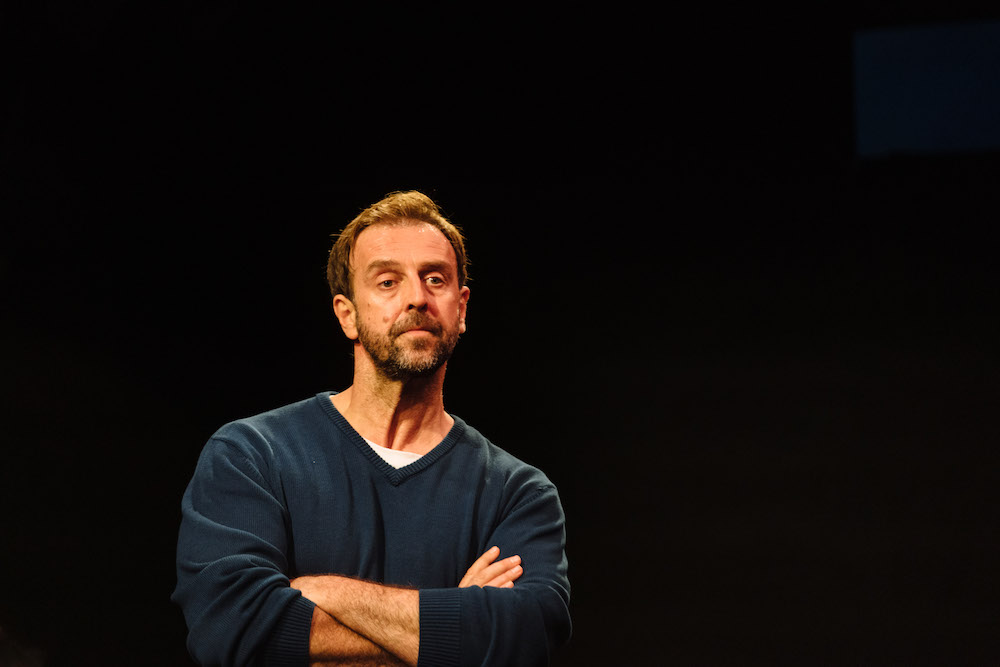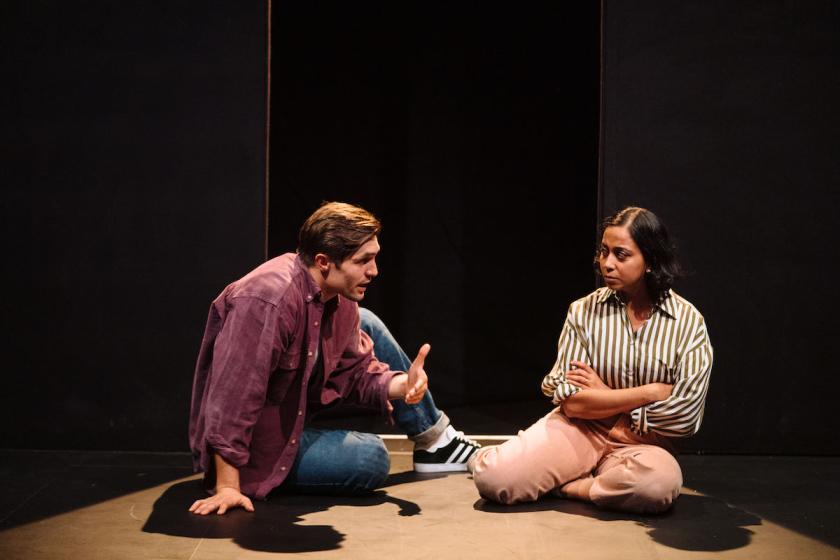Air travel is bad for us. Yes, yes, I know we need planes to take us long distances, but look at the downside: not only the carbon footprint, but also the anxiety. I used to feel pretty relaxed about flying, then – one day on a short European flight – there was a spot of turbulence and I glimpsed the faces of the cabin crew. And they were certainly not relaxed.
Unbidden, the thought jumped into my mind: what do they know that I don’t know? Since then I have been horribly conscious of the fear of flying, and it is this anxiety that accelerates the emotional fuel of the dramatically titled Brace Brace, by Oli Forsyth, this year’s recipient of the Jerwood New Playwright award, and whose new play is being staged at the Royal Court’s suitably claustrophobic studio space.
The plot is simple, but terrifying. Young professionals Ray and Sylvia have just got married when, on their honeymoon flight, their plane is hijacked by a single violent man. As he struggles with the pilot, the aircraft first ascends sharply, then plunges towards the sea. Ray and Sylvia, however, manage to overcome the hijacker and the flight is saved. Because she got to the cabin first, Sylvia is praised as the main hero: she even gets interviewed on television about the near catastrophe – but when it emerges that the hijacker has severe mental problems, the tensions between the incident’s survivors begin to intensify.
I have to say that while the plot’s set up is both nightmarish and ludicrous, really straining credibility, Forsyth’s representation of Ray and Sylvia’s relationship is perceptive and beautifully sharp. From their meet cute at a party to their escalating arguments about their experience of acute trauma, they come across as thoroughly imagined and instantly relatable. For while Ray wants desperately to move on from the horror, Sylvia just can’t let go. As they argue about exactly what happened, and how the perpetrator should be punished, a whole variety of feelings emerge. The key issue is mental health; the key question: can your optimism survive trauma?  In passages of writing that could apply to any major upset, Ray thinks that Sylvia is becoming increasingly paranoid, and that she is isolating herself in the memories of the trauma. For her part, she feels that her husband is unempathetic and doesn’t understand the depth of her experience. In actual fact, it gradually emerges that she has some awful memories that he doesn’t, can’t, really share. But the main point is that both feel increasingly separate from each other: in processing their trauma they are drifting apart rather than coming together in healing. And this could, and often does, apply to any shared tragedy.
In passages of writing that could apply to any major upset, Ray thinks that Sylvia is becoming increasingly paranoid, and that she is isolating herself in the memories of the trauma. For her part, she feels that her husband is unempathetic and doesn’t understand the depth of her experience. In actual fact, it gradually emerges that she has some awful memories that he doesn’t, can’t, really share. But the main point is that both feel increasingly separate from each other: in processing their trauma they are drifting apart rather than coming together in healing. And this could, and often does, apply to any shared tragedy.
Forsyth tackles this story with a confident theatricality that imbues the staging with a fierce energy. His Ray and Sylvia chat directly to the audience, contest each other’s memories and act out scenes from the trauma in a series of quick switches from one angle to another, likewise also switching from anxiety to anger to comedy to seriousness. While this vigorous writing works well in grabbing our attention, the big questions – mental health, personal choices, false memory, survivor’s guilt, vengeful feelings, conspiracy theories – are introduced, but regrettably remain unexplored. The implausibility of the scenario spreads to the moral themes. Lots of things are mentioned, none are deeply thought through.
At one point, Sam, the parent of a young girl who the couple chaperoned on the fateful flight, comes into Sylvia’s life, which nicely complicates some parts of the story, but then he swiftly disappears. With a running time of barely 70 minutes, and an ending that seems inconclusive, the play feels more like a fragment than a finished piece. While it comes alive because of the vitality of the playwriting, it is also disappointingly slender and, given the importance of its main themes, rather frustrating. You can see why some of its writing is strong, but that doesn’t make it a satisfying watch.
Yet despite the unconvincing plotting, the production, directed by Daniel Raggett and designed by Anna Reid with Paul Arditti’s gripping soundscape, does have an impact. The staging is vividly abstract, with a sinister pit and a runway strip that acts also as the interior of the plane and a metaphor for PTSD taking off. And what a cast! Ted Lasso’s Phil Dunster and Wicked Little Letters’ Anjana Vasan have great onstage chemistry, and the fractured quality of the story’s construction means that you don’t notice the rapidity of the shifts in their characters’ psychology. They are well supported by Craige Els (pictured above), who plays several roles. But in the end Brace Brace is just a work in progress.















Add comment